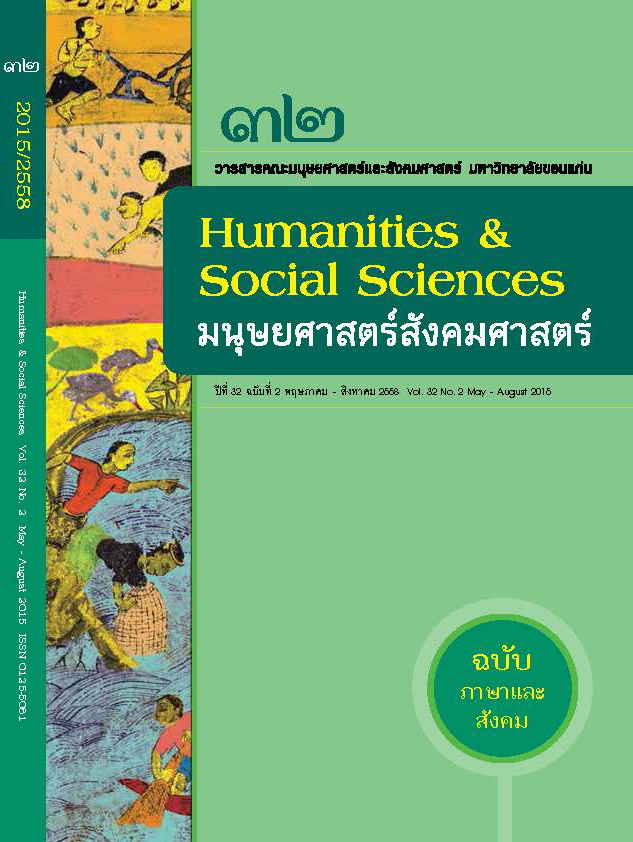การจัดการพัฒนาอาชีพเสริมที่มีวัดเป็นศูนย์กลางสู่ชุมชนที่ยั่งยืน: กรณีศึกษาชุมชนบ้านตูม ตำบลในเมือง อำเภอเมือง จังหวัดขอนแก่น
Keywords:
การจัดการอาชีพเสริม, การพัฒนาชุมชนที่ยั่งยืน, การพัฒนาโดยมีวัดเป็นศุนย์กลางAbstract
การจัดการพัฒนาอาชีพเสริมที่มีวัดเป็นศูนย์กลางสู่ชุมชนที่ยั่งยืน:
กรณีศึกษาชุมชนบ้านตูม ตำบลในเมือง อำเภอเมือง จังหวัดขอนแก่น
The Management of Developing Supplementary Occupation By Having Wat As A Center Towards Sustainable Community: A Case Study of Ban Tume Community, Thumbol Nai Maeung, Amphur Maeung, Khon Kean Province.
บทคัดย่อ
วัตถุประสงค์ของการวิจัยนี้เพื่อศึกษาสภาพอาชีพหลักและอาชีพเสริม การวิเคราะห์ปัจจัยที่มีผลต่อการประกอบอาชีพเสริมของคนในชุมชนบ้านตูมบริเวณรอบวัดศรีธาตุ ตำบลในเมือง อำเภอเมือง จังหวัดขอนแก่น และการหาแนวทางการพัฒนาอาชีพเสริมของคนชุมชนบ้านตูมในบริเวณรอบวัดศรีธาตุ ตำบลในเมือง อำเภอเมือง จังหวัดขอนแก่น การวิจัยนี้เป็นการวิจัยแบบผสม (Mixed Method Research) เครื่องมือที่ใช้ในการวิจัยได้แก่ Participatory Action Research (PAR) สัมภาษณ์ผู้ให้ข้อมูลสำคัญจำนวน 15 ราย ได้แก่ ผู้นำชุมชน ผู้บริหารวัด และผู้เชี่ยวชาญเกี่ยวกับวิชาชีพ สัมภาษณ์เชิงลึก ( In-depth Interview) กับคณะกรรมการวัด จำนวน25 คน และการแจกแบบสอบถามกับคนในชุมชน ที่มาใช้บริการที่วัดจำนวน 200 ราย จากจำนวนประชากร 1,328 คน สถิติที่ใช้ในการวิเคราะห์ข้อมูล ประกอบด้วย ร้อยละ (Percentage) ค่าเฉลี่ย (Mean) ส่วนเบี่ยงเบนมาตรฐาน (Standard Deviation), t-test (Independent samples), F-test One- way ANOVA, ค่าสัมประสิทธิ์สหสัมพันธ์ของเพียร์สัน (Pearson’s Correlation Coefficient), Factor Analysis และPath Analysis ผลการวิจัยพบว่า ผู้มาใช้บริการวัดส่วนใหญ่เป็นเพศหญิง อายุมากกว่า 40 ปีขึ้นไป มีความคิยดเห็นเกี่ยวกับการบริหารจัดการให้บริการของวัดโดยรวมอยู่ในระดับมาก ส่วนปัจจัยที่ส่งผลต่อการดำเนินงานการให้บริการ7 ด้านและการพัฒนาอาชีพเสริมที่มีวัดเป็นศูนย์กลางสู่ชุมชนที่ยั่งยืน มีจำนวน 32 ปัจจัย และเป็นแนวทางการจัดการพัฒนาอาชีพเสริมที่มีวัดเป็นศูนย์กลางสู่ชุมชนที่ยั่งยืนได้เพียง 10 ด้านคือ (1) ด้านการดำเนินการเผยแผ่พระพุทธศาสนา (2) ด้านการบริหารจัดการให้บริการของวัด (3) ด้านการส่งเสริมการให้บริการของวัดเพื่อเป็นศูนย์กลางการพัฒนาชุมชนที่ยั่งยืน (4) ด้านการจัดระเบียบอัตราค่าใช้จ่ายและเครื่องสังฆภัณฑ์(อุปกรณ์เครื่องมือเครื่องใช้)ภายในวัด (5)ด้านการจัดระเบียบและการรณรงค์การปฏิบัติธรรม ทรัพยากรเหลือใช้และการส่งเสริมอาชีพเสริม (6) ด้านการจัดการศาสนสถานและภูมิทัศน์ของวัด (7) ด้านการจัดการองค์ความรู้ให้ชุมชน (8) ด้านบุคลากรผู้ให้บริการและส่งเสริมกิจกรรมของวัด (9) ด้านการสร้างกิจกรรมด้านจริยธรรม หลักธรรม และอาชีพเสริมให้คนในชุมชน และ(10) การจัดการวัตถุมงคลของวัด
คำสำคัญ: การจัดการอาชีพเสริม การพัฒนาชุมชนที่ยั่งยืน การพัฒนาโดยมีวัดเป็นศุนย์กลาง
Abstract
The objectives of this research were as follows: To study the situation of principle and supplementary occupation, analyze the effective factors of managing supplementary occupation of civilian in Ban Tume community, Thumbol Nai Mueang, Amphur Mueang, Khon Kaen Province, and search for managing supplementary occupation development of civilian in Ban Tume community, Thumbol Naimueng, Amphur Mueng, Kon Kean Province. This research was a mixed method research. The methodology of this research was composed of: participatory action research (PAR) by interviewing 15 important information providers such as community leader, Wat administrator and occupation expert, the in-depth interview was practiced with 25 Wat administrative commitees , and questionnaire was used with 200 sample size of the wat service users form 1,328 civilians of Ban Tume community. Statistics analysis Such as percentage, means, and standard deviation, t-test (Independent sample) , F-test: One-way ANOVAS, Pearson’s Correlation, factor analysis, and Path Analysis etc., were used in this research. The research results were as follows: The service users information; mostly were female with age over 40 year old. Their opinion upon Wat service management was at high level. There were 32 effective factors of service management and the supplementary occupation development by having Wat as a center towards sustainable community. However, the guideline of managing the supplementary occupation development by having Wat as a center towards sustainable community should be composed of 10 aspects as follows: (1) Actions to spread Buddhism aspect,(2) The service management of Wat aspect, (3) The services marketing promotion of wat towards a sustainable community aspect , (4) The management of organizing expense rate and ecclesiastical property aspect, (5) The management of regulation and the campaign of merit practice, exceed resources and supplementary occupation promotion aspect, (6)Management of ecclesiastical place and wat environment aspect, (7) Knowledgeable management for community aspect, (8) Services and activities of Wat staff to community aspect, (9) ethic, Buddhist principle and supplementary occupation for civilian in the community aspect, and (10) Wat Buddhist worship Talisman aspect.
Keyword: Supplementary Occupation Management, Sustainable Community Development, the development by having Wat as a center



